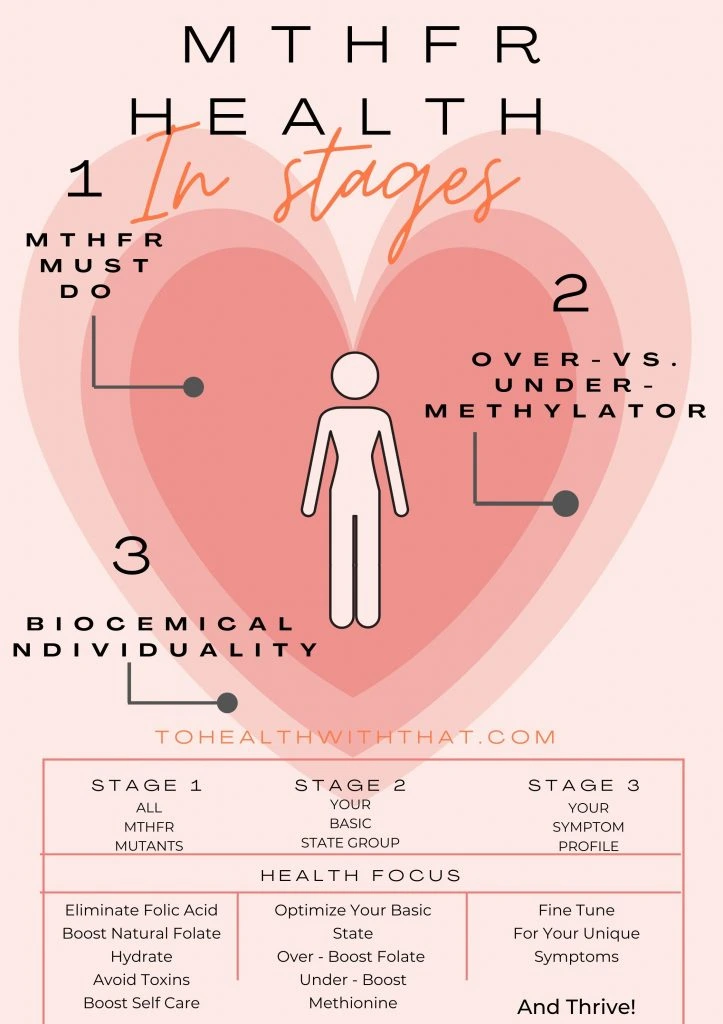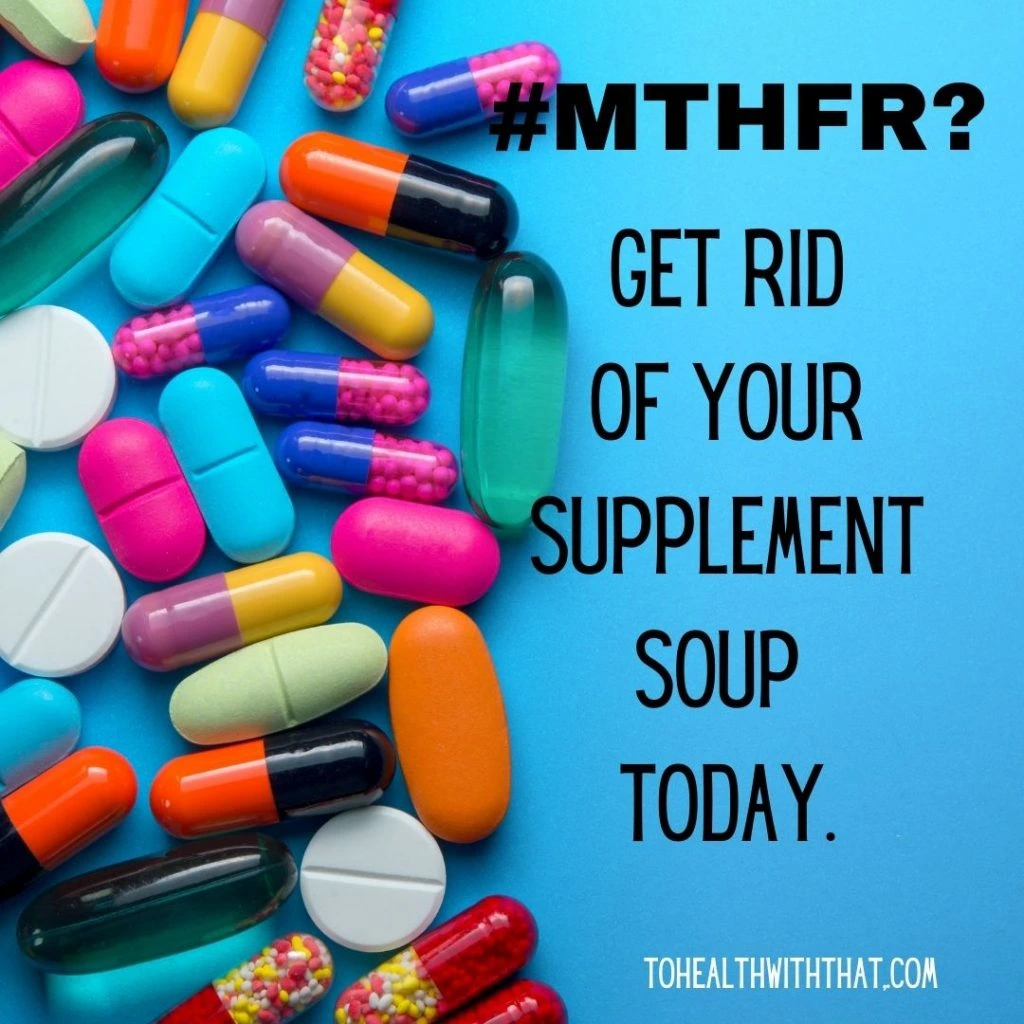Working with MTHFR can be a very different experience for every person, but it does help to have a system, a method to tackling this large and diffuse problem. Let’s face it – MTHFR is tangled up in all of the big health issues that we face in the modern world. Inflammation, sensitivity and reactivity, oxidative stress and antioxidant status, nutritional status, and (God help us all) mood and neurotransmitter function.
When a health issue has this type of scope, it helps to approach it in a clear and systematic way so that we’re prioritizing the biggest and most impactful steps first, instead of trying to improve every symptom with no regard for the whole person.
Because of this, I tend to move from general to specific in a three phase process.
- Changes that are general to all MTHFR mutants – things like eliminating folic acid in the diet, introducing food sources of natural folate, and beginning to balance methylation.
- Changes that are specific to your MTHFR Basic State – essentially, this is still working on balancing methylation and compensating for your MTHFR issues, but it’s working in it in a way that is more specific to you.
- Changes that are specific to you – this is when we start to look at issues that are highlighted in your case – so if you’re a MTHFR mutant with an overlying picture of structural pain, hormonal migraines, and estrogen dominanace, your picture is different from someone in the same basic state group with cardiac issues and anxiety. Some of your symptoms will have become better or even resolved fully with the basic steps, but anything that hasn’t can be addressed specifically. This is when we’re typically doing things like food sensitivity elimination, antioxidant reviews, hormone balancing and managing lingering symptoms.

There are exceptions to the rules (of course!)
There are times, of course, when this order isn’t right for the person standing in front of me. Always we’ll start with the basics, but in some people it is clear that one particular aspect of their health needs to be made a priority from the start. This could be mental and emotional state in a person who has lost their joy, or in a person who is scared to leave their home. It could be hormone balance in a person with bigger hormone issues or who is trying to get into a good place to have a baby. It could be inflammation in a person who is having pain that interferes with functioning. This isn’t a rigid system, it is a general guideline that I find helps to streamline the process of moving toward health.
Let’s face it – healing can get really messy and often starting with the particulars before you actually do the general, background things you know you should do, ends up in a scenario I see quite often. I like to call it “Supplement Soup.”
“Supplement Soup”
This is a thing I hear about all the time. Somewhere in my first visit with a client they send me a complex chart of supplements that they are taking. Usually about a third of them are the good things that everyone hears so much about. Fish oil, vitamin D, CoQ10, vitamin C, and whatnot. These might have been recommended by someone, they might just have been picked up along the way.
Another third were suggested by practitioners through the years. Often, the person taking them doesn’t remember what they were for, may or may not notice that they do anything, and many of them have been part of their routine for so long that they’ve just faded into the background.
Then there’s the desperate attempts. “My neighbor said this helped her when she had joint pain and I have joint pain so I’m trying it.” Or, “this one had a really good commercial/was suggested by the guy in the vitamin shop/my mother-in-law swears by…” And so it goes.

This is often a full-on spreadsheet of 12, 18, even 30+ supplements. This represents a giant commitment on every level. A commitment of time, decisions, energy, money and not least of all, a commitment of metabolic resources. Not only do you have to shop for, buy, and pay for all of those supplements, you also organize and sort all of those pills, powders and goops. You have to schedule them into your day in a meaningful way to get the most out of them, and then your body has to do a tremendous amount of metabolic work digesting, absorbing, processing, utilizing, rejecting or eliminating those substances. In every way, taking too many things is just as hard on your body as not getting the things your body really needs. Supplement soup is just another burden.
If you’ve just gone to open the drawer/cupboard/storage unit where you keep all of your various pills and powders and whatnot and noticed that you have enough things to supply a small army, then you’ve also fallen into the supplement soup.
In every way, taking too many things is just as hard on your body as not getting the things your body really needs.
– Amy Neuzil, tohealthwiththat!
Fixing Supplement Soup
If you’re working with a practitioner, here’s where you sit down with them and do a supplement review with the goal of eliminating 50% or more. If you’re not working with a practitioner, then here’s how we’re going to approach this.
Divide your supplements into four piles:
| Group | What To Do With This Group |
| Things that make a noticeable difference. | Keep them! These are making your life better. |
| Things that don’t make a noticeable difference. | Stop taking these for two weeks and if you still don’t notice a difference, get rid of them. |
| Things that don’t make a noticeable difference but everyone is supposed to take them. | If this is 1-2 things, great. Use your judgement. If it’s 12 things, start making the hard decisions. Eliminate at least half of them, and more if you can. This is all work your body has to do and that energy could be better spent elsewhere. |
| Things that don’t make a difference and they’re ingredients in a good multivitamin. | Ditch all of these and replace with one good multivitamin. |
The goal when you get to a supplement soup place is to take stock and cut out half if not more of the stuff you’ve built up. Very few people actually thrive with a whole handfull of supplements and often people end up taking things that conflict with each other, cancel each other out, or aren’t doing anything anyway. Plus, lots of practitioners are willing to suggest supplements, but not as many will ask you to stop them. Fewer is always better.
This Process Does Not Apply to Prescription Medications. If you want to decrease the number of those that you’re taking, it is vital that you work with your prescribing physician(s).
Food Sensitivity Elimination – Another Big Exception.
Food sensitivity eliminations are actually another exception to the general rule. In an ideal world, this would be one of the first things people would do, but the sad truth is that elimination diets are hard and take a huge commitment. Because of that, I want people to have some investment in the system before I’m asking them to do something quite so difficult. I want people to feel a bit better, see some results, and generally be ready. Not so much because they should be waiting to challenge their food sensitivities, but mostly because I don’t want to scare them away with something incredibly difficult before they start seeing the light.

The goal in working from more general to more specific, is to make a minimum of changes with the biggest impact on your health. It also means we’re bypassing the quick-fix-take-this-pill strategy in favor of the more meaningful, but also more difficult, life changes. There is a time and a place for a quick fix, or a band-aid, but it should never be the long term plan.
Speaking of long-term plan, thank you for listening and if you’re interested in joining the Beta group for the MTHFR 101 class, sign up for the mailing list on the website – tohealthwiththat.com, or email me directly. Amy@tohealthwiththat.com – We’ll be ready to go this spring, which is 2021.
MTHFR is a common genetic mutation that can contribute to anxiety, depression, fatigue, chronic pain, infertility, and more serious conditions like breast implant illness, heart attack, stroke, chronic fatigue syndrome, and some types of cancer. If you know or suspect you have an MTHFR variant, schedule a free 15-minute meet-and-greet appointment with MTHFR expert Dr. Amy today.
Book Your Appointment
